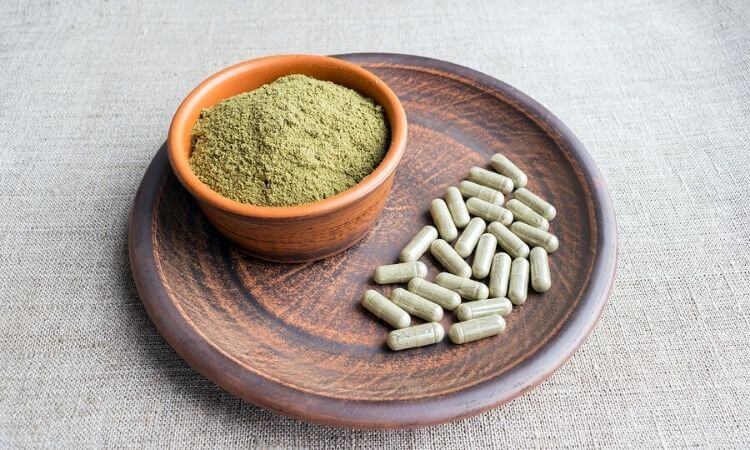
Kratom (mitragyna speciosa) is a plant native to Southeast Asia that is also commonly transported into the U.S. for distribution. At low doses, kratom has a stimulant effect and may induce pleasant feelings and energy. At higher doses, it has a sedative effect and can result in sedation.
Although not technically an opioid, kratom does act on opioid receptors, and its use can result in dependence, which is a condition that will cause withdrawal symptoms upon discontinuation of use. The withdrawal symptoms associated with kratom may be similar to the flu-like symptoms that occur during opioid withdrawal.
Although medical professionals do not generally recommend it, many people report using kratom as a means to get off of heroin or other opioids. Kratom’s ability to act on opioid receptors is what makes it effective for this purpose. However, persons attempting to stop the use of opioids are urged to instead undergo a medical detox and enter a comprehensive treatment program.
At the time of this writing, the Drug Enforcement Administration categorizes the plant kratom as a “drug of concern.” Efforts to classify this drug as a controlled substance have been met with considerable backlash. As such, it is currently legal at a federal level and is commonly found in tablet or powder form.
Symptoms of Kratom Withdrawal
According to the DEA, physical kratom withdrawal symptoms may include the following:
- Runny nose
- Muscle aches and pains
- Joint or bone pain
- Jerky movements of arms and legs
- Insomnia
- Constipation
- Tremors
- Chills and sweating
- Lethargy
- Nausea
- Vomiting
- Headaches
- Darkening of the skin (e.g., the face)
- Seizures
Mental or emotional symptoms may include:
- Hostility and aggression
- Mood swings
- Anxiety
- Depression
- Insomnia
- Irritability
In cases of severe dependence, psychosis, including hallucinations and delusions, can occur.
Like opioid withdrawal, symptoms of kratom withdrawal generally starts within 6-12 hours of the last dose, and they peak at about 2-3 days. Most physical symptoms will have subsided after a week, but emotional symptoms can persist for much longer.
The duration and severity of withdrawal symptoms are closely related to the level of abuse and length of time it has been used. Furthermore, other medical or mental health problems may affect the intensity of withdrawal. Polysubstance abuse (concurrent use of other drugs or alcohol) may prolong or worsen the withdrawal process.

Detoxing and Weaning Off of Kratom
Many types of addictive substances, such as benzodiazepines, can be slowly tapered off over time to avoid the potentially severe symptoms and cravings that come with abrupt withdrawal. The goal is to gradually rebalance brain chemistry over time instead of jolting it by suddenly removing the drug.
When a drug substance such as kratom is discontinued abruptly after a person has developed a dependence, the brain may experience a rebound effect, in which it tries to restore balance rapidly, resulting in significant withdrawal symptoms. Tapering down the dosage of kratom can mitigate the side effects of withdrawal, as the brain’s chemistry is given a chance to regain its natural balance gradually.
Moreover, instead of stopping kratom “cold turkey,” tapering down the dosage slowly during detox may be preferable. A detox may include the use of medications or supplements to manage withdrawal symptoms and drug cravings, as well. If a rapid detox is warranted, persons are generally advised to undergo a professional medical detox rather than attempt to do so on their own.
Advantages of Medical Detox
A medical detox is performed in a clinical environment and may be done on an inpatient or outpatient basis. In either case, a person is provided with consistent access to medical and mental health professionals and medications, if needed. In this setting, patients will be safe and comfortable and may experience a significant reduction in the number of, and intensity of, withdrawal symptoms.
Medications commonly administered to treat emotional withdrawal symptoms may include antidepressants or anti-anxiety medication. Other pharmaceuticals may also be prescribed to treat physical symptoms such as nausea, insomnia, and high blood pressure.
If other substances have also been abused, other medications may be needed to avoid complications or unwanted drug interactions. It is important to indicate to treatment providers if, in addition to kratom, there may be any other substances in your system so that medications used during medical detox are safe and effective.
Getting Treatment for Addiction
Midwood Addiction Treatment offers individualized, state-of-the-art detox services and programs designed to treat addiction and address all aspects of a person’s health and emotional well-being. All of our programs feature therapies and activities clinically proven to be beneficial during the process of recovery.
If you or someone you love is addicted to kratom, other drugs, or alcohol, contact us today! We are committed to helping as many people as we can break the cycle of addiction and free themselves from the abuse of substances for life!